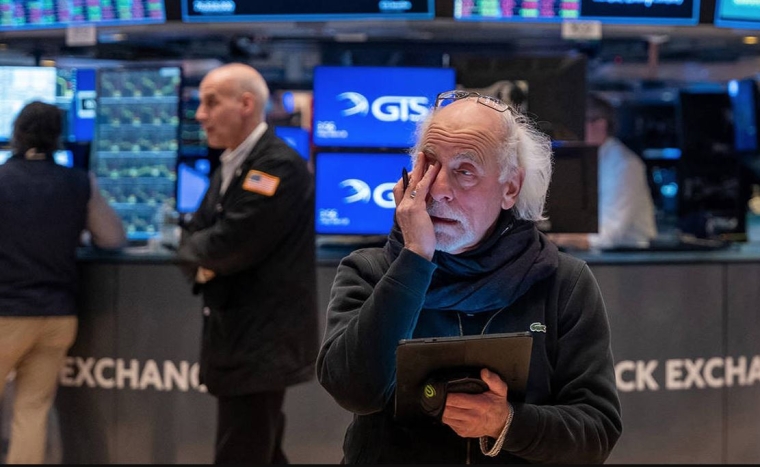
By Desmond Lachman*
Wall Street traders have been known to joke that the longest river in the emerging-market economies is “de-nial.” But given the irrational exuberance gripping the US stock market – which is trading at historically high valuations, despite escalating geopolitical risks and reckless economic policies from President Donald Trump’s administration – one might think they are running cruises on it.
Geopolitical stability appears to be in short supply nowadays. Europe is grappling with its largest land war since World War II; violence and turmoil are again gripping the Middle East; and America’s relations with China are plumbing new lows, with potential consequences for the smooth supply of Taiwanese semiconductors to the United States.
Meanwhile, economic risks are mounting within the US, largely as a result of Trump’s policies. The highest import tariffs in a century will reduce the economy’s long-term competitiveness, while preventing it from reaping the full benefits of international trade. And Trump’s mass-deportation efforts will impede domestic production and raise costs, particularly in agriculture and construction.
Trump is also jeopardising America’s fiscal health. To be sure, US public finances were on an unsustainable path before Trump returned to the White House in January. According to the Congressional Budget Office (CBO), the US budget deficit amounted to 6.4% of GDP last year, despite nearly full employment. If the US had remained on that trajectory, its public-debt-to-GDP ratio would have swelled to 118% of GDP in 2035.
Now, it is set to get there even sooner – and Trump’s “One Big Beautiful Bill,” which became law last month, is a major reason why. The CBO estimates that the sprawling tax and health-care legislation will add $3.4 trillion to the budget deficit over the next decade. The Committee for a Responsible Federal Budget puts that figure above $4 trillion. This would increase public debt to at least 125% of GDP by 2034.
The US economy has a fundamental vulnerability: it relies heavily on the willingness of strangers to finance its twin budget and trade deficits. Foreign investors currently own about $8.5 trillion – almost one-third – of the $28 trillion in outstanding US Treasury bonds. (The same is not true in other countries, such as Japan, where domestic investors hold about 87% of government bonds.) If foreign investors are to continue financing US borrowing, they must have confidence that the country will honor its debt commitments fully, rather than attempting to inflate them away or to renege on its repayment obligations.
Yet Trump seems to be going out of his way to convince foreign investors that the US cannot be trusted. For starters, he is putting enormous pressure on the US Federal Reserve to cut interest rates aggressively, even though inflation – already running well above the 2% inflation target – is likely to rise, owing to Trump’s tariffs.
Furthermore, Stephen Miran – the chair of Trump’s Council of Economic Advisers, who has now been nominated to serve temporarily on the Fed Board of Governors – has proposed forcing foreign investors to convert the Treasuries they currently hold into 100-year US bonds without coupon payments. The Trump administration has also considered imposing a tax of up to 20% on the interest some foreign bondholders earn on their T-bills. Trump’s recent firing of the head of the Bureau of Labor Statistics, following the release of disappointing employment data, has only compounded investors’ unease.
If foreign investors’ confidence in the US collapses, dollar and bond-market crises will follow. In fact, the dollar and bond markets are already reacting to rising risks. Since the beginning of this year, the dollar’s value has plunged by around 10%, despite higher import tariffs and the widening of the short-term interest-rate differential with other major economies. And Treasury bond yields have been elevated, suggesting that the US Treasury market is no longer perceived as the safe haven it once was. Meanwhile, gold prices have increased by around 25%.
And yet, stock-market valuations remain sky-high – much like before the dot-com bubble collapsed in 2001. There is some precedent for this. As the economic historian Niall Ferguson has noted, the stock market remained buoyant on the eve of World War I, despite clear signs that the geopolitical order was crumbling.
An explanation is more difficult to discern. As Isaac Newton allegedly said following the collapse of the South Sea Bubble in 1720, “I can calculate the motion of heavenly bodies, but not the madness of people.”
Desmond Lachman, a senior fellow at the American Enterprise Institute, is a former deputy director of the International Monetary Fund’s Policy Development and Review Department and a former chief emerging-market economic strategist at Salomon Smith Barney. Copyright: Project Syndicate, 2025.
14 Comments
Will it still seem overvalued when the printing press gets fired up and your cash is inflated away?
Getting Hard to find a safe haven in this environment.
Solar power and add value to my land is top o list.
A lot of stocks are crazy PE Rations.
All boomer retirement money chasing capital gain for retirement lifestyle. Shouldn't be news that is destabilizing investment options worldwide as it's more or less become gambling. Even the greatest value investor is struggling to put cash in places that make sense, aka W Buffett.
He has a cash mountian waiting for the kaaaark moment.
A lot of stocks are crazy PE Rations.
Look at Commonwealth Bank of Aussie. PE ratio around 30 - highest for any bank in the world. Because people believe that the Ponzi is infallible and because large buying of CBA happens by default from pension funds, people think the stock price is a no brainer.
They're thinking rationally. And CBA's share price has gone gangbusters over past 5 years. And perhaps they're right.
But that doesn't mean you shouldn't think critically about this.
Note: PE ratios do have limitations in determining relative value.
If foreign investors’ confidence in the US collapses, dollar and bond-market crises will follow.
Well, yes, of course. But what does that crisis look like? Oddly enough, the way the US is going, it looks like they'll be in more of a crisis than most.
Does the increasingly common loss of (nominal) reserve bank independence also equate to a loss of confidence in the institution and its role, and if so does that lead to widespread loss of confidence in currencies?
I'd say, not widespread, but yes, in relation to those where the independence no longer exists.
Same as the courts, where the independence no long exists.
I'd say, not widespread, but yes, in relation to those where the independence no longer exists.
Less about independence and more about power structures. Remember the Fed is owned by private banks. It's not an entity of the people.
Indeed - and would I rather have Fed power, than Presidential power? - sadly, where Trump is President, I'd have to say more power to the Fed. Far more intelligence around their table than the Cabinet table.
Or neither.
But if the 'belief' in major currencies breaks down so does trade....and most of the world is not set up for constrained trade.
The transition would be both painful and (likely) deadly.
Agreed. Currency war, leads to trade war, leads territory manipulation/war, leads to shooting war.
Over the past half century, stocks have not risen when measured in real money. If you don't believe me, just look at SPX priced in gold v. SPX priced in USD since August 1971.
Stocks appear to be rising - society appears to be getting wealthier - because the denominator in which their prices are measured (fiat USD) is continually debased.
Price is going up because the money in which it's measured is dying. Arguably the greatest illusion in modern society.
And one of the largest contributors to wealth disparity... for the wealthy on average benefit from this phenomenon, while the poor and middle class remain neutral or are harmed.
I suspect that the same denominator applied to house prices would show a similar picture, putting the lie to real capital gains - these are coming primarily from devalued money (the medium of exchange).
You understand. But this is the last thing you're going to hear from the finance industry and the parasites who get to feast on programs such as KiwiSaver. And to be honest, I think that is deceitful at best. In reality, I think that even those we look up to as 'financial experts' are not really as clever as many think they are. People are not told that in order to benefit from equity markets, you need the alpha. And we are told that if we are getting 10-12% pa on equities, that we are 'doing well' when the actual scenario is that we are 'breaking even'.
What an outstanding article !!!
You really do have to wonder why Trump is doing so much self inflicted damage to the U.S economy.

We welcome your comments below. If you are not already registered, please register to comment
Remember we welcome robust, respectful and insightful debate. We don't welcome abusive or defamatory comments and will de-register those repeatedly making such comments. Our current comment policy is here.